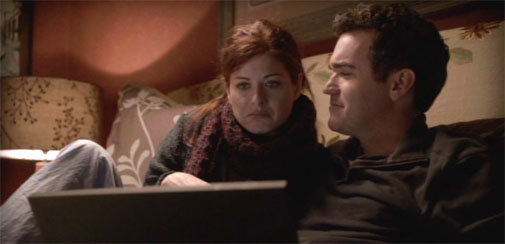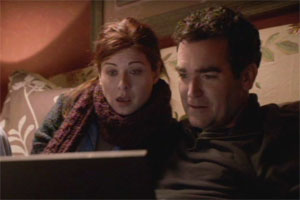
After I had written mostly positive things for TV WORTH WATCHING last year about a public-television series called
Theater Talk (read the column
HERE), I didn't think I'd be writing about this Broadway-news series again soon. Then NBC premiered
Smash, and before the first episode was finished, I knew I had guessed incorrectly.
 The show, about Broadway folks trying to mount a new musical about Marilyn Monroe, name-dropped New York Post theater columnist and Theater Talk cohost Michael Riedel in a key scene. One of the lyricists of the Marilyn musical, played by Debra Messing, anticipated a Riedel column reviewing a leaked video of a performance of the show's first song by calling him "a creep" and a "Napoleonic Nazi"...
The show, about Broadway folks trying to mount a new musical about Marilyn Monroe, name-dropped New York Post theater columnist and Theater Talk cohost Michael Riedel in a key scene. One of the lyricists of the Marilyn musical, played by Debra Messing, anticipated a Riedel column reviewing a leaked video of a performance of the show's first song by calling him "a creep" and a "Napoleonic Nazi"...
And then, once she discovered the review of her song was positive, changed her own tune. "You know, everyone gets so mad at him," she tells her husband, who had just found Riedel's blog review on his laptop, "but he tells the truth."
Last July, my only criticism of Theater Talk was the seemingly egocentric role Riedel assumes each week, commandeering all but the opening credits and often reducing cohost and executive producer Susan Haskins' participation to that of a silent partner -- a part he obviously enjoys playing. My criticism was on a small scale.
But NBC had reached millions with the Nazi line, and most of the next episode of Theater Talk was spent talking about Smash, including several references to the walk-on roles Riedel will be doing for the series. I wanted to find out if he was as pleased by the Smash "slur" as I suspected. He was.
 "I've been called worse," he said with a laugh during a recent phone interview. "Accurate," he laughed again, would be the worst.
"I've been called worse," he said with a laugh during a recent phone interview. "Accurate," he laughed again, would be the worst.
Many people would be offended by the NBC line, but not Riedel, who for years has loved to get under the skin of most of the people he writes about.
Nathan Lane has called him "Rosemary's Baby."
Stephen Sondheim, who once contacted by a writer who was profiling Riedel, said, "It didn't occur to me that he was important enough to write about." Sondheim reportedly holds a long-standing grudge. Even though many in the Broadway community read and watch his work, a lot of them apparently do so with fear and resentment.
Like a guy who loudly sounds a klaxon horn in a cathedral, the columnist doesn't mind upsetting the emotions of those who think of theater as a holy calling. Chances are good no one will be selling cuddly Michael Riedel stuffed toys outside New York theaters -- and a better guess is some producers and stars readily would purchase a Riedel voodoo doll. For a man who once dreamed of being a lawyer, taking on daunting opponents was just a navigational recalculation.
As a young reporter, Riedel said he used to spend free time in the newspaper's morgue, reading and drawing inspiration from the acid-soaked, pot-shot-filled writings of gossip columnists Walter Winchell and Dorothy Kilgallen -- newspaper legends who knew well what it was like to have tons of power and just as many enemies.
"This is the way to cover Broadway," he said he thought at the time. Fifteen years later, the 45-year-old Riedel counts being called a Nazi on a Stephen Spielberg-produced television series as a sort of milestone in the emulation of those early idols.
That's the case, even though television is a medium that takes little of his time or attention. He said he never watches himself on Theater Talk ("I would be mortified if I watched myself on television," theater critic Riedel said). St. Elsewhere was the rare television series that won his attention. Growing up, Columbo was a favorite, though he said the title character, played by Peter Falk, wasn't why he watched.
"I was more enamored of the murderers," he explained.
Should those who watch and/or read him suspect by now that his behavior is part of a persona he created to enhance the "Winchellesque" image he craves, Riedel isn't sure what the answer is:

"At this point, I'm afraid I've lost sight of the real me and the 'crafted personality,'" Riedel wrote in an email.
Though newspapers are an endangered species, and working for one owned by Rupert Murdoch might make employment even more hazardous, Riedel has at least 20 years before reaching a traditional retirement age. Does he think the pressures of combat eventually will wear him down? He thinks not: "I never get bored with it."
And he claims he won't as long, as he continues to mix the gossip with "a little bit of news, something no one knows about" -- advice he gleaned from the late New York Times columnist William Safire. Readers get bored, Safire advised, if all you write is opinion.
A book Riedel is under contract to finish this year should have a healthy mix of fact and opinion. He says it's the story of how Broadway saved New York City. It's pretty certain he's already happily anticipating the reviews of his adversaries, who will say the real story is how one New Yorker's strafing almost surely will destroy Broadway.
Riedel responds: "Alexander Woolcott, Dorothy Parker, Robert Benchley, Clive Barnes, John Simon, Frank Rich and Ben Brantley weren't able to kill Broadway. I hardly think I can."